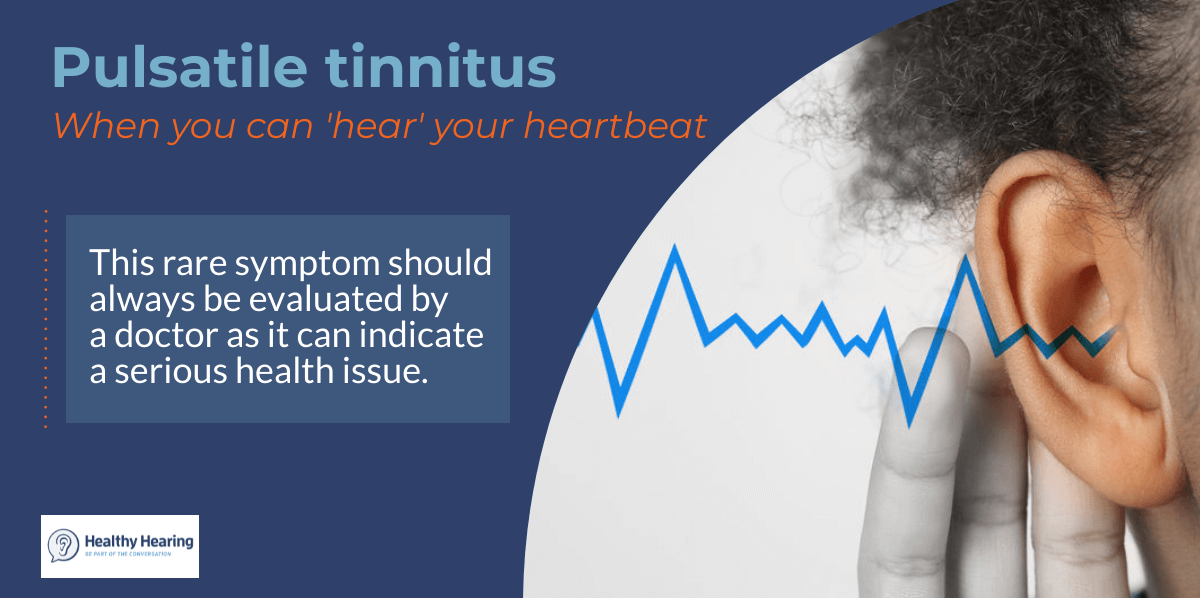|
www.HealthyHearing.com |
What is pulsatile tinnitus?When you can easily hear your own heartbeat
Contributed by Madeleine Burry Key points:
Wondering why you can feel your pulse beating in your ear? This is what happens when you have pulsatile tinnitus, which is ear ringing in sync with your heartbeat. It’s a rare form of tinnitus, a common condition that affects many people. Pulsatile tinnitus accounts for about 1 percent of all tinnitus cases, according to the National Organization for Rare Disorders (NORD). “While it's often benign (not bad or harmful), it's more likely to have an identifiable source, and may be the first sign of some kind of underlying condition,” says Rebecca Lewis, AuD, audiology director of the Adult & Pediatric Cochlear Implant Program at Pacific Neuroscience Institute at Providence Saint John’s Health Center in Santa Monica, CA.
If you have pulsatile tinnitus, it can be more than a nuisance—it can indicate an underlying health problem that merits follow-up. Here’s what you need to know if you experience a rhythmic thump in one or both ears. What does pulsatile tinnitus sound like?The trademark symptom of pulsatile tinnitus is when the sounds in your ear are in sync with your heartbeat, Lewis says. It can sound like pulsing, pounding, whooshing, pulsating, thumping or drumming. You may also feel throbbing. Standing versus lying downHearing your heartbeat when you exercise is common, she notes. But with pulsatile tinnitus, “you might hear your heartbeat in your ear, even when you're just laying down, not exerting yourself,” Lewis says. There’s a difference between standard tinnitus and pulsatile tinnitus. Doctors may be able to hear it, tooWhen you hear the clicking or ringing of ordinary tinnitus, it’s characterized as a "subjective" sound—nothing is actually ringing, and others are unable to hear the sound. The sound is illusory. In contrast, pulsatile tinnitus is characterized as "objective." That is, a sound is occurring in your body, and doctors may be able to hear it, according to NORD.
The whoosh or thump of your heartbeat in your ear may change depending on your position, such as when you turn your head or lie down, according to Northwestern Medicine. It can be in your right ear, left ear, or both ears. As with other types of tinnitus, pulsatile tinnitus can be disruptive or merely irritating. What causes a pulsing or pounding sound in the ear?The important thing to remember about tinnitus is that it’s not a diagnosis. That is, tinnitus is “a side effect of something else,” Lewis notes. With regular tinnitus, hearing loss is the most common culprit. Some potential underlying conditions that cause pulsatile tinnitus are:
Also, anemia, head trauma, and hyperthyroidism are also sometimes associated with pulsatile tinnitus, Lewis says. Some conditions—such as anemia and pregnancy—can lead to an uptick in how much blood your heart pumps, which can be a reason pulsatile tinnitus occurs. Certain medications can also cause it, especially if they increase blood pressure in the brain. In the majority of cases of pulsatile tinnitus—70 percent—an underlying cause can be determined, per a February 2022 narrative review of the condition published in JAMA Otolaryngology Head and Neck Surgery. This review divvies up the causes into three groups: structural (eg, a tumor), metabolic (eg, ototoxic medications or a spasming muscle in the middle ear), and vascular (eg, carotid artery stenosis, which is when the arteries on the side of your neck get narrower). There is also "muscular tinnitus," which refers to pulsing tinnitus that is caused by muscular problems. It is more common in people with degenerative disorders like multiple sclerosis and amyotrophic lateral sclerosis. Is it dangerous or bad to hear my heartbeat?That largely depends on what's causing it. That's why it's important to see a doctor. "When someone hears this telltale tinnitus, it may not be dangerous itself, but usually is a symptom of a different health concern that may or may not be,” Lewis says. So don’t ignore it—follow up with your primary care doctor or an otolaryngologist (aka an ENT, or ear, nose, and throat doctor). “It's better to just go in and get an evaluation and not be worried about it. Usually it's modifiable,” Lewis says. Given the variety of potential causes, you can expect that your doctor will take a patient history and examine you, as well as getting images (such as an MRI or CT), and potentially ordering bloodwork, according to the Weill Cornell Brain and Spine Center. This may involve several doctor’s visits or referrals. Treatment optionsYour treatment will vary—your health care provider will first want to identify and tackle the underlying cause. If you have anemia, high blood pressure, or an undiagnosed thyroid condition, for instance, treatment for those conditions might help resolve symptoms, Lewis says. It may also mean stopping your current medication and trying a different one. Surgery may help for a blood vessel disorder, tumor, or ear abnormality, per Penn Medicine. Sometimes the underlying cause is unknown, or due to an irreversible issue, such as hearing loss. In those cases, the best option is to manage the tinnitus symptoms. Common strategies used to do so include the following, according to Lewis:
Bottom lineIf you can hear a pulse-like sensation in one or both ears, get prompt medical help. In most cases, it is treatable. RELATED: What to know about tinnitus and blood pressure drugs. Madeleine Burry
Related Help Pages:
Tinnitus (ringing in the ears) Symptoms Causes Treatment Meniere's disease Dizziness
|
Featured clinics near me
Earzlink Hearing Care - Reynoldsburg
7668 Slate Ridge Blvd
Reynoldsburg, OH 43068

Find a clinic
We have more hearing clinic reviews than any other site!



 Madeleine Burry is a Brooklyn-based freelance writer and editor. She's written about health for several online publications, including Women's Health, Prevention, Health, Livestrong and Good Housekeeping. You can follow her on Twitter @lovelanewest.
Madeleine Burry is a Brooklyn-based freelance writer and editor. She's written about health for several online publications, including Women's Health, Prevention, Health, Livestrong and Good Housekeeping. You can follow her on Twitter @lovelanewest.